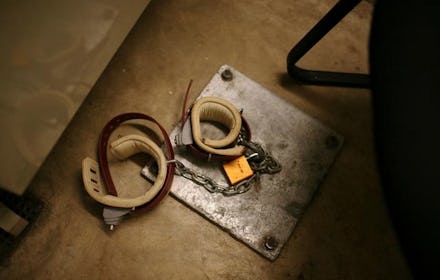What I Say to My Colleagues Who Carry Out Torture

Last week, the Institute on Medicine as a Profession (IMAP) issued a hard-hitting report revealing that doctors participated in interrogation and torture for the U.S. government. The two-year investigation, conducted by a 19-member task force, found that doctors were involved in administering torture -- including inhumane acts like waterboarding, force feeding, and sleep deprivation. The doctors involved were renamed “safety officers” by the military, a deliberate move to divorce doctors from medical ethics.
These military doctors’ actions make my job -- as well as the jobs of other public health advocates and medical professionals -- more difficult. They help foster a loss of trust from the public.
A doctor’s job is not to be a “safety officer” -- it is to be a healer, and a guardian of health, rather than a government interrogator. Ethics are at the core of the medical profession. That is the sacred covenant described in the Maimonides prayer, that hangs in the doctors lounge in my hospital. Maimonides, a Jewish physician who was the physician to the court of Salauddin, wrote about humanism in medicine:
“Inspire me with love for my art and for my profession, for these are the enemies of truth and love for mankind, and they can lead astray in the great task of attending to the welfare of Thy creatures.”
This theme of avoiding harm is echoed in the Hippocratic Oath, which every American doctor recites upon entering the profession. It also requires every physician to respect the privacy of a patient:
“Whatever I see or hear in the lives of my patients, whether in connection with my professional practice or not, which ought not to be spoken of outside, I will keep secret, as considering all such things to be private.”
In my own work promoting child health, it is important that patients be able to trust me, and stories like this help shake the trust of patients. Take the story of Dr. Afridi: a doctor who collaborated with the CIA to collect DNA samples under the premise of carrying out a vaccination campaign. Medical workers were shot by the Taliban in 2010, claiming that they were spies. Fostering mistrust of doctors and vaccines in Pakistan is especially dangerous for public health when it is a country where a child dies every minute from a preventable disease. When stories like these, whether it is abroad or at home, make headlines, they create room for patients to question whether or not we have their best interest at heart.
I remember, a few years ago, I was treating a child in the emergency room for his asthma attack. His oxygen was low, his breathing labored, and he was not responding to medications as I’d hoped. He needed to be admitted to the intensive care unit, in critical condition. His parents were resistant to certain medications, and the father gave various reasons for not trusting pharmaceuticals. He spoke about Tuskegee, a shocking study that was not revealed until 40 years later, where 400 African American men with syphilis were allowed to suffer and die from the disease -- without realizing that they had it in the first place. Despite being enrolled in a study, the men were left untreated.
I understand that not every family will agree with my recommendations, and that is every family’s right. However, in this particular case, pervasive mistrust stopped my conversation with the patient’s family from the start. I struggled to explain why I was different from those U.S Public Health service doctors, who deliberately allowed African American men to suffer and die from syphilis, despite having an easy cure available. Even after pointing out that the case happened years ago -- and that we adhere to much higher ethical standards now -- I could not shake him of his mistrust. How do I tell a father that atrocities committed by U.S. physicians is a thing of the past, if my colleagues are committing acts of torture today?
When doctors violate their professional ethics by engaging in torture, they not only harm the affected individuals -- they also harm the profession and society as a whole. Doctors in the military might be subject to a chain of command, but that doesn’t protect them from responsibility for human rights abuses. No one “makes” you do anything in such situations -- you always have the choice to protest, walk away, maybe go to jail or face a dishonorable discharge. Citizenship or race should not determine whether or not someone receives treatment: a doctor should treat every human being.
A doctor’s job should never involve torture; the duty of a physician is always to serve humanity by alleviating suffering.